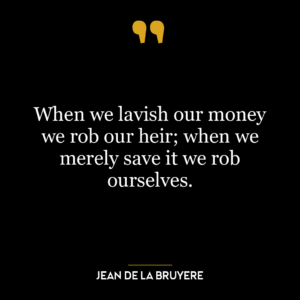This quote emphasizes the futility and emptiness of consumerism driven by the desire to impress others, particularly those we do not genuinely care about. It suggests that we often fall into the trap of acquiring material possessions not for our own satisfaction or needs, but to meet societal expectations or to gain approval from others. This behavior can lead to unnecessary expenditure, financial stress, and even debt, without bringing any real happiness or fulfillment.
The quote also implies that our self-worth should not be determined by external validation or material possessions, but by our own values, actions, and personal development. It encourages us to be more mindful about our consumption habits and to prioritize our genuine needs and personal satisfaction over societal pressures or superficial appearances.
In today’s world, this idea is particularly relevant considering the rise of social media and the constant exposure to others’ lifestyles and possessions, which often leads to social comparison and pressure to conform. It can be applied in personal development by promoting self-awareness, mindful spending, and the cultivation of self-esteem that is not contingent on material possessions or others’ approval.
Furthermore, it can encourage us to invest more in experiences, relationships, and personal growth, which are often more fulfilling and meaningful than material possessions. It can also contribute to a more sustainable and responsible consumption, which is crucial in the context of environmental challenges.
Lastly, by freeing ourselves from the need to impress others, we can focus more on our authentic interests, passions, and goals, thus leading a more fulfilling and authentic life.











